To make the desktop in the kitchen finished appearance, is traditionally used for countertops plinth. Manufacturers offer different types of building materials, has its advantages and disadvantages. Choosing a suitable option, you should pay attention to the shape and the physical and technical characteristics. Offer to meet with the distinctive features of each.
Read article
- 1 kitchen plinth features for countertops
- 2 Plinth for countertops in the kitchen: the main types of
- 2.1 Plastic
- 2.2 Aluminum
- 2.3 Natural and artificial stone
- 2.4 Wood and granite
- 3 Design and equipment plinths for countertops
- 3.1 Flat, triangular and rectangular
- 3.2 Rounded and curly
- 4 Advantages and disadvantages
- 5 additional functionality
- 6 Choosing kitchen plinth: attention to the important parameters
- 6.1 For technical specifications
- 6.2 On design decisions
- 7 Installing moldings, depending on the type of
- 7.1 Hidden
- 7.2 built-in
- 7.3 Overhead
kitchen plinth features for countertops
Skirting set on the table for various reasons. This part provides:
- decorative effect. It allows you to give the finished look of kitchen sets, becoming an integral part thereof;
- It protects against moisture. Spilled liquid on the countertop and remain thereon, preventing swelling of the working surface due to prolonged exposure to moisture;
- protects from dust. Due to the plinth can not be afraid of falling into the gap between the countertop and the wall of crumbs, food residue and other debris. This greatly facilitates the care of the kitchen unit.

PHOTO: isu.org.ua
Plinth for countertops in the kitchen: the main types of
For the manufacture of skirting board can be used various kinds of materials. It affects the appearance of design in the kitchen worktop, and the durability of the element used. Offer to meet with the main species and their distinctive features.
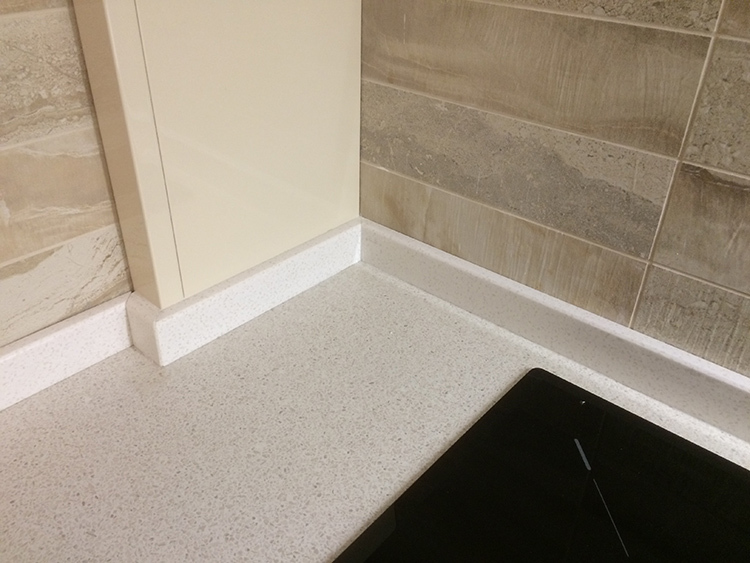
PHOTO: creamondi.md
Plastic
Plastic moldings, due to its availability, the greatest demand. They are made of PVC by coextrusion. Manufacturers offer products in different colors. For this part of the molten plastic is injected a certain amount of color pigment. There are models that mimic metal, stone, tiles and other materials. In the manufacturing process of the front surface of the laminated layer having a characteristic pattern.
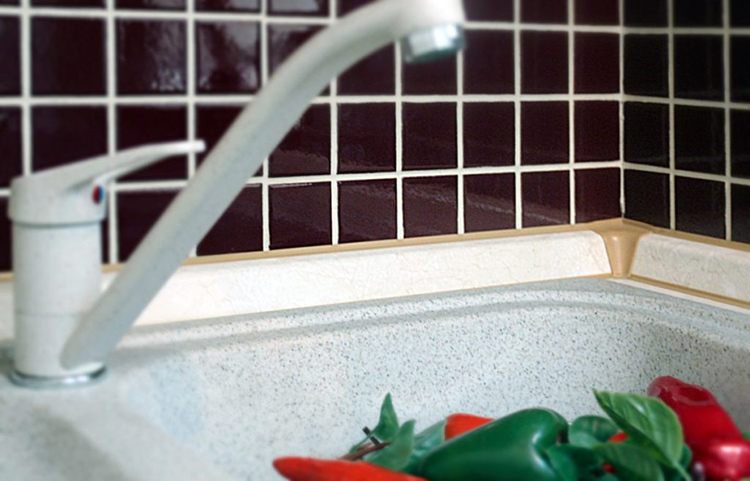
PHOTO: vseme.ru
Some moldings allow installation of strips made of a material countertops. Due to its flexibility, can be attached to walls with different curvatures. Note, however, that exposure to direct sunlight may fade.
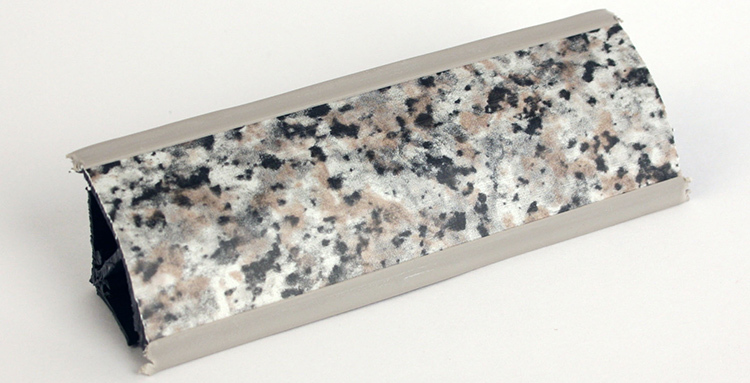
PHOTO: mf72.ru
Aluminum
Durability aluminum plastic significantly higher than the plastic analogue. For its production using solid anodized profile, preserving the integrity in the event of high impact. Capable of harmoniously fit into any kitchen interior, as this color is combined with metal Handles for furniture and appliances. Thanks to the thoughtful design performance are easy to install. However, they should only be fixed to an even surface.
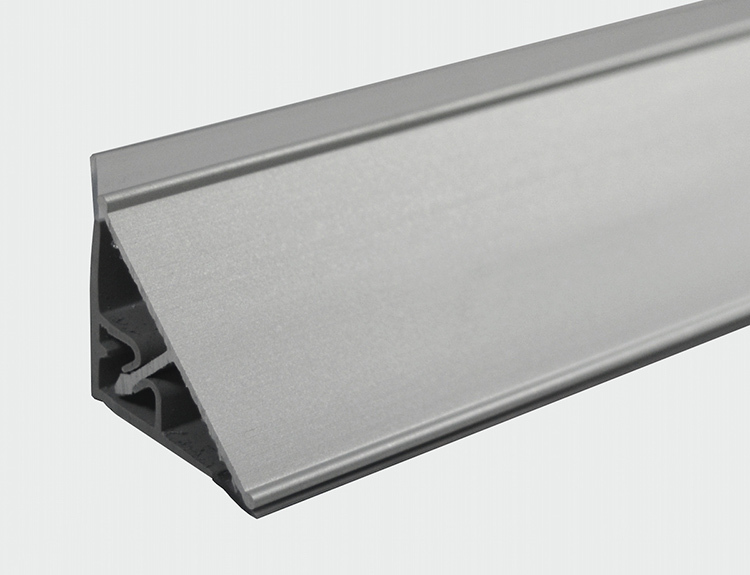
PHOTO: grace-panels.com
Natural and artificial stone
For the manufacture of a plinth for countertops in the kitchen is often used natural and artificial stone. Its configuration can be arbitrary. These products have a presentable appearance, forming a whole with top product. Height of the Stone decor often exceeds 200 mm. Sometimes baseboards made of quartz or acrylic replace kitchen apron.
The product is made of natural or artificial stone has the same advantages as the countertop. The best option is for the kitchen granite having a better resistance to staining and moisture. On the surface of the marble can occur typical scratches. He's worse than adapted for use in the kitchen. Acrylic stone inferior in wear resistance of quartz, poorly withstands high temperatures.
Attention! Plinths made of natural or artificial stone are expensive.
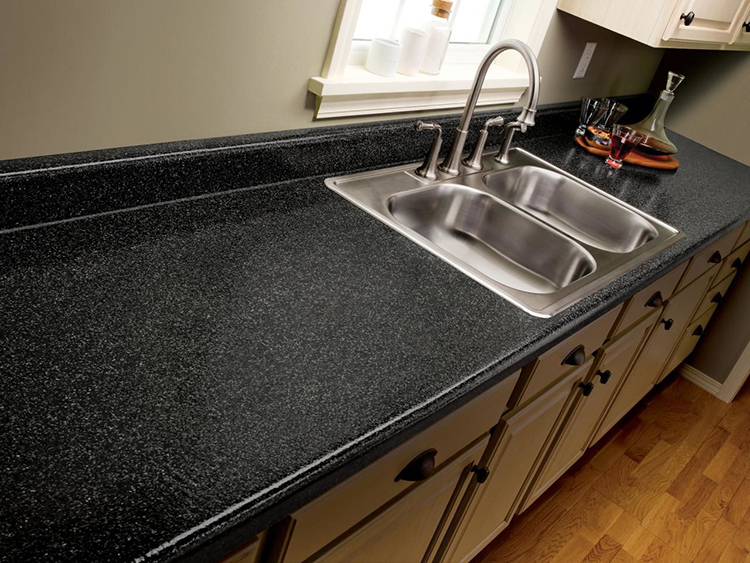
PHOTO: i.simpalsmedia.com
Wood and granite
Wooden curbs demand in the design countertops made of natural wood or veneer. Perfectly in harmony with the working area of the tree, such products have a low moisture resistance and hygiene. They are afraid of mechanical action and respond poorly to temperature fluctuations. To improve the performance characteristics of the wooden plinth is processed by special trains. They are made usually of oak, beech, pine and ash.
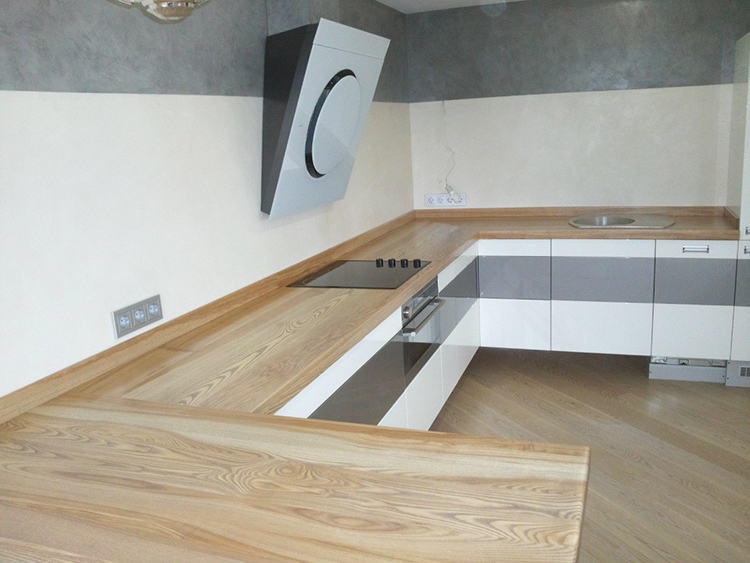
PHOTO: static.tildacdn.com
Opt for porcelain is often, if such material is made of an apron. Characterized hygienic, impact resistance, resistance to mechanical abrasion and staining. Not afraid of high temperatures. Durable.
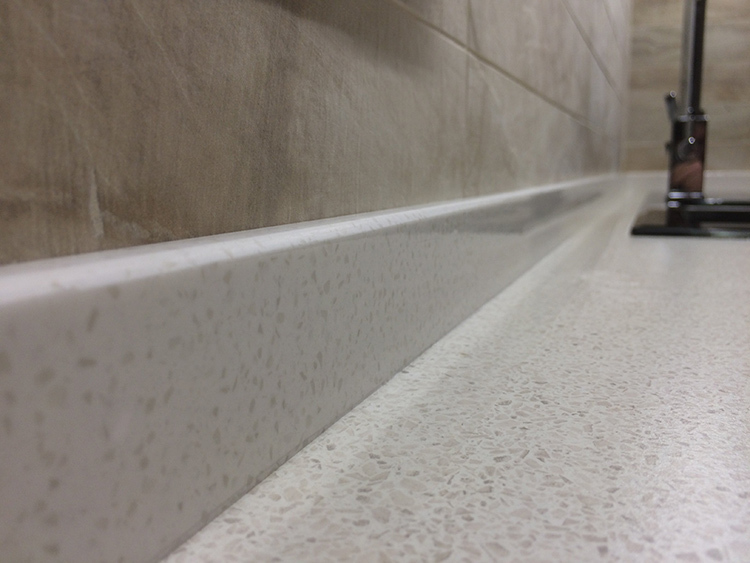
PHOTO: roomester.ru
Design and equipment plinths for countertops
Design and equipment plinth for countertops is directly dependent on the manufacturer. Choosing a suitable option, you should focus on the design of the kitchen and the appointment of the purchased item. We offer to meet with the available solutions to make it easier to choose the form of strips.
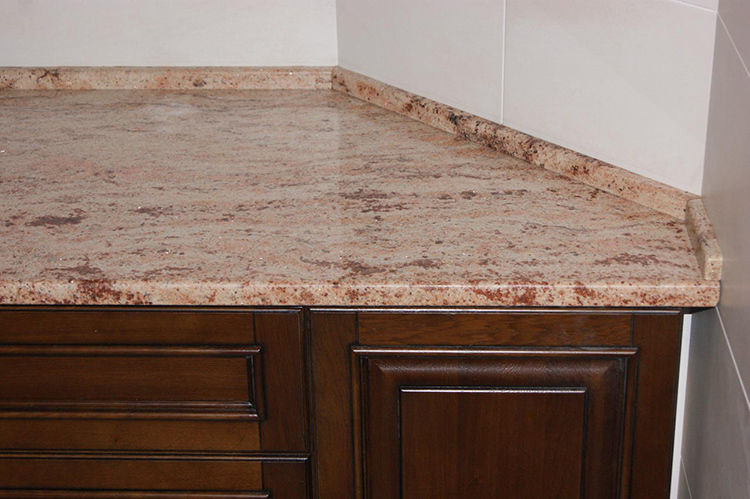
PHOTO: vkamne.com
Flat, triangular and rectangular
If the distance between the wall and the worktop minimum, the best solution will be a flat floor. They help hide the gap without disturbing the interior of kitchen units. This is especially true for the kitchen, decorated in a minimalist style.
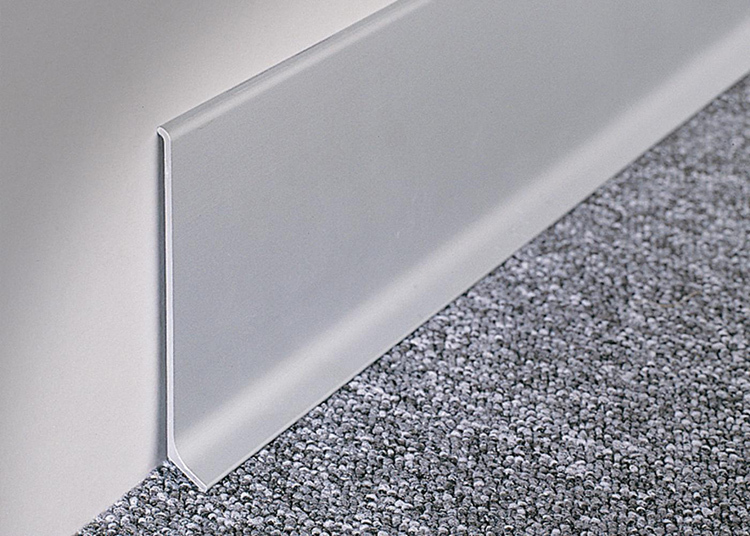
PHOTO: zatirka.kiev.ua
Triangular products have gained the greatest distribution. This is the classic version, the interior of which is ideal for wiring. Plinth consists of a straight inner corner to be attached to the wall and the table top, and a smooth sloped surface that performs a decorative function.
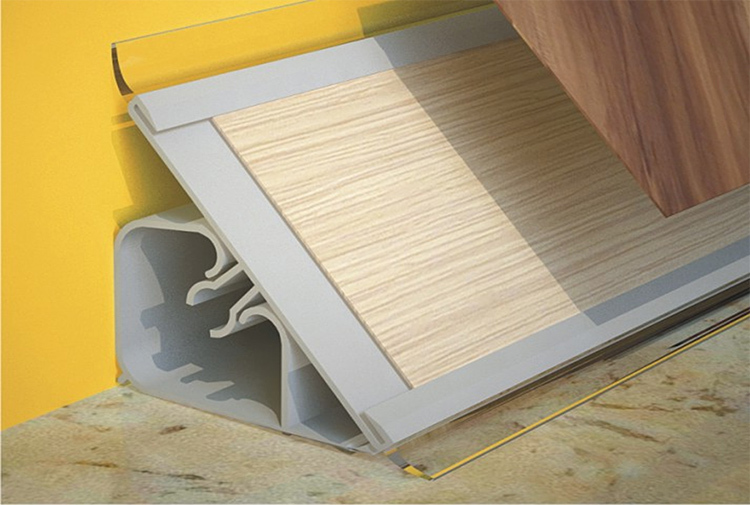
PHOTO: decoplint.ru
Rectangular or square elements, thanks to its design, allow us to hide the wires. Most often, this is a metal plinth.

PHOTO: d-plintus.ru
Rounded and curly
Rounded plinth - pristennye bumpers with smooth convex shape. Often used to place the wires for different purposes, as, thanks to its design, allow to place them under the surface without problems.
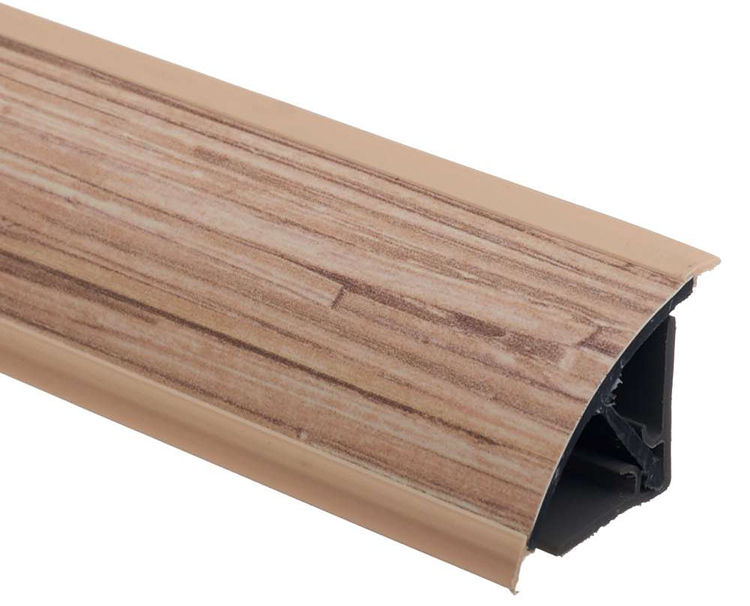
PHOTO: mebeltrade12.ru
Curly curbs perform a purely decorative function. They have light curves and ridges that give the elements of the beautiful appearance, but do not extend their functionality.

PHOTO: ilim-prom.ru
Advantages and disadvantages
Advantages and disadvantages of baseboards closely linked to the materials used to manufacture them. For example, a plastic frieze:
- cost is cheap;
- It has a high moisture resistance;
- simple and easy to install.
However, in appearance plastic skirting inferior products made of wood or stone. At the same time, the last are more expensive. In the immediate vicinity of the hob when heated low-quality models can release formaldehyde.
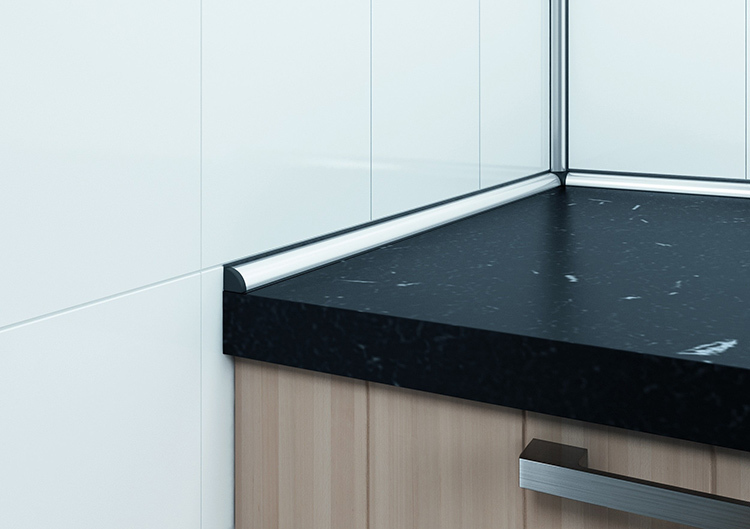
PHOTO: roomester.ru
additional functionality
Structure plinth for countertops presupposes internal channels. This greatly expands the possibilities of baguette. It is often used to disguise the wires laid in the kitchen.
If used for the manufacture of semi-transparent plastic, it can be used for the organization of the backlight. Suffice it to lay the tape inside the LED channels.
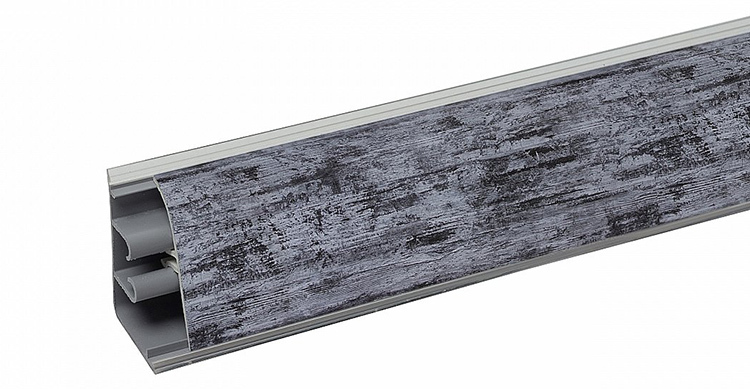
PHOTO: usadmebel.ru
Choosing kitchen plinth: attention to the important parameters
Choosing a suitable option, should focus not only on appearance but also on the technical characteristics of the specific model. This significantly simplifies installation work and will allow to achieve the desired effect on the design table top.

PHOTO: artdeko.in.ua
For technical specifications
When choosing a suitable option for the design of kitchen units should pay attention to:
- Profile material. The choice is made in favor of heat-resistant products. During operation, the baseboard is located near the hob, will inevitably heat up. With insufficient heat resistance level quite rapidly cracked element;
- size element. It must be related to the size of the gap between the countertop and the wall.
Tip! Taking the form of a baguette, pay attention to its size. The larger the gap between the countertop and the wall, the greater must be the baseboard.
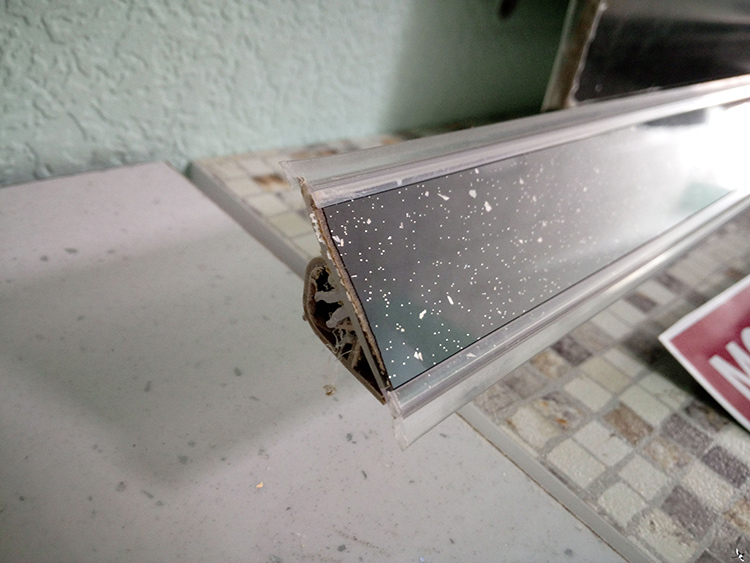
PHOTO: 40-ka.ru
On design decisions
The design of the plinth should be correlated with the general stylistic premises. It is desirable to give preference to products that are superficially similar to the elements used in the design of the kitchen. If there is a railing hanging lockers, should choose the baseboard similar form.
The color selected according sink and countertops. You should also take into account the pattern and color scheme apron.

PHOTO: lavrfurnitura.ru
Installing moldings, depending on the type of
How to install the plinth depends on its type. Design element defines the procedure for mounting and fastening. Check out the possible options to decide which is right for your kitchen.
Hidden
Not everyone likes straps that are attached to the wall and worktop. In this situation, an alternative option would be the so-called hidden plinth, made of silicone. This element is almost imperceptible at the location of the gap, but at the same time be able to fulfill its function. We offer watch a video to learn how to perform its installation:
built-in
This is part of the frieze apron or countertops. During installation ensures the correct spatial arrangement of the tabletop and an apron, and a junction processed sealant.
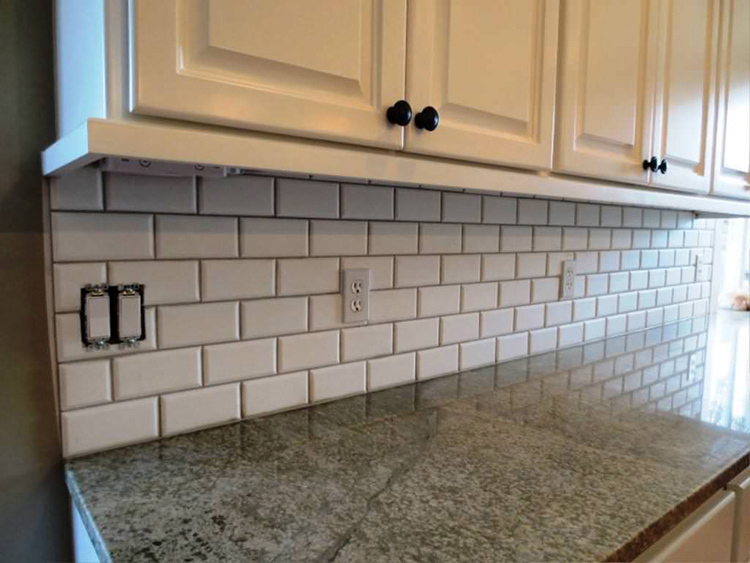
PHOTO: pickmanmuseumshop.com
Overhead
Mounting Surface skirting usually performed in the following sequence:
- with a base removed decorative strip;
- measured length of the table top circuit. All elements are cut to size. Trims made slightly shorter than the corresponding base. The ends of the base are stripped to prevent injury;
- joint walls and countertops treated with sealant;
- a base attached to the wall and table-top by means of screws. Clamps should be placed with a pitch of 30 cm. The individual parts are joined together by means of connecting elements and the corner. In the past there are special slots for easy latching segments foundations;
- decorative strip neatly folded and installed in the base;
- mounted plugs. At this renovated kitchen complete. Desk completely ready for lunch.
Tip! To prevent slippage plugs during operation, the ends of the skirting board should handle silicone.
If you still have questions about the order of installation work, it is advisable to see the following video:
Share in the comments, what type of plinth for countertops in the kitchen you preferred. Why did you opt for this item?



